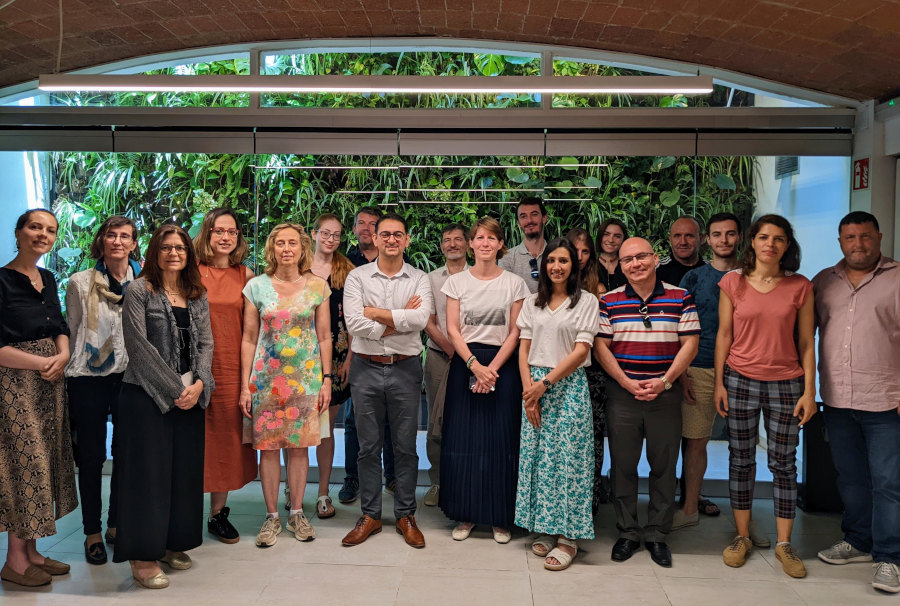AI for health: Towards an intelligent system for monitoring, analysis and recommendation in cancer immunotherapy
The Qualitop project, coordinated by Prof. Hacid at LIRIS, aims to improve cancer management, using artificial intelligence techniques to efficiently collect and aggregate real medical data on patients' quality of life.
Cancer immunotherapy research has revolutionized medicine. Described as the fifth pillar of cancer therapy - after surgery, radiotherapy, chemotherapy and precision medicine - immunotherapy has enabled significant advances in cancer treatment. Alone or in combination with chemotherapy, immunotherapy has proved highly effective in certain cancers: up to 60% objective response rate in melanoma and 80% complete response rate in acute lymphoblastic leukemia. New research will offer more patients with aggressive cancers the chance of overcoming their disease and achieving long-term survival.
After the start of immunotherapy, immune-related AEs can appear at any time - from a few days to over a year after the end of treatment. Their duration varies considerably, and the most severe symptoms may lead to treatment discontinuation. Immunity-related AEs are common (affecting up to 96% of patients), but their impact on quality of life (QoL) is not well known.
Indeed, the vast majority of data are collected in randomized clinical trials (RCTs) in a standardized context that focuses on causal inference of treatment efficacy. Nevertheless, in everyday life, patient profiles and behaviors can be very different from those observed in RCTs. As a result, real-life data are attracting immense interest and becoming an essential source of pragmatic information needed by various stakeholders (patients, relatives, practitioners, pharmacists, health authorities, general population) and for updating recommendations. Meanwhile, many patients wish to be effectively and adequately informed about the best treatment approach in their specific case, alternative options, types and management of side effects, as well as the impact of treatment on their lives, including health status, lifestyle, work capacity and family life.
There are currently three main challenges to improving the quality of life of cancer patients after immunotherapy:
- Determining “predictive markers” or “patient subpopulations” associated with the development of immunity-related AEs to help prevent, predict and manage these effects and improve patient outcomes. These elements cannot be determined in RCTs due to the strict inclusion criteria applied in these trials. In-depth analysis of many additional variables is required in larger patient populations than those included in clinical trials.
- Better understanding of patients' real life after the start of immunotherapy (lifestyle, polymedication to treat symptoms associated with immunity-related AEs). In clinical trials, data on quality of life are not systematically collected, and when they are, they are generally assessed over short periods. Moreover, quality of life is assessed using standardized questionnaires that do not fully reflect the reality experienced by patients. Given the complexity of the causes of immune-related AEs, recent studies have highlighted that some symptoms reported by patients in clinical trials could be immune-related AEs but are never taken into account.
- In order to overcome the two previous challenges, much more diversified data sources and larger numbers of patients need to be included in research studies.
This was the background to the H2020 QUALITOP project (2020-2024), led by the Laboratoire d'Informatique en Images et Systèmes d'Information (LIRIS). Its aim was to develop and implement a European immunotherapy platform based on advanced data analysis, the use of artificial intelligence techniques, and simulation modeling approaches to efficiently collect and aggregate real-life quality of life data, monitor patient health status, perform causal inference analyses, and develop risk reduction recommendations for patients.
The research led to the design and development of a secure data integration platform (PoC) including:
- Identification of data requirements (qualification and pre-processing) for efficient monitoring
- Design and implementation of learning algorithms for patient trajectory calculation and recommendation generation
- Specification and implementation of the monitoring process integrating static and dynamic data
- Development of a set of analysis and visualization tools on top of the monitoring workflow.
- Finally, the development of a system interaction approach based on large language models (LLM).
The Qualitop project team, comprising scientists from Université Claude Bernard Lyon 1, Université Lumière Lyon 2 and Hospices civils de Lyon
Published on March 19, 2025 – Updated on March 20, 2025



 en
en fr
fr
 es
es

